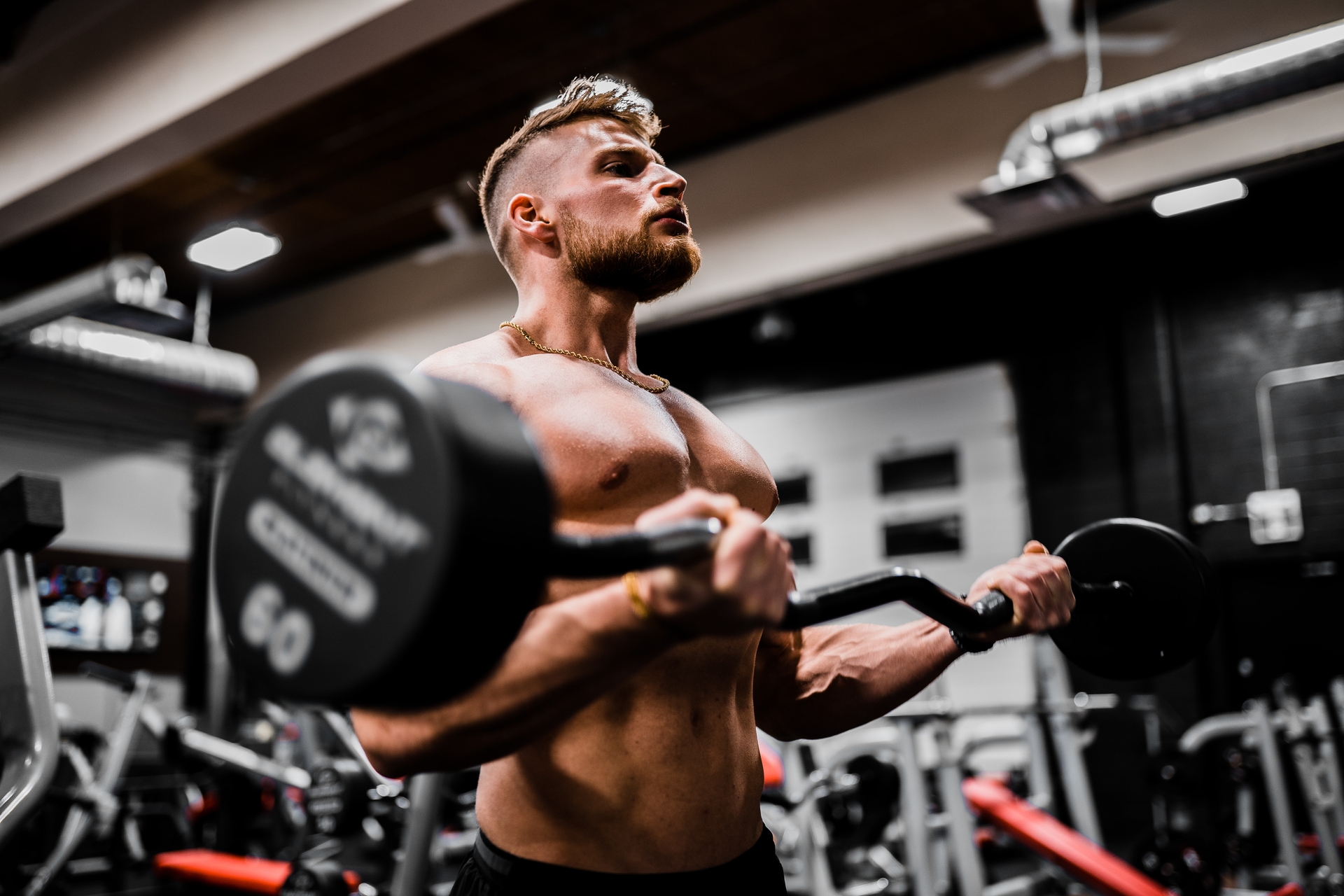
Get the Six Habits for Overcoming Isolation Guide for free
Studies have shown that over half of the American population believes doing their taxes is easier than figuring out how to eat healthily and over ten billion donuts are consumed in the US every year. At least one in four people eat some type of fast food on a daily basis, and only three out of ten Americans believe that all calories play an equal role in weight gain.
The nutritional aspect of fitness is incredibly important, and it can either work for you by enhancing your results or against you by causing a plateau in your progress. Proper nutrition does not equal buying the latest supplement fad but rather following a set plan that increases the momentum toward your goals.
Listen to the podcast version here
I have a lot of gratitude for my parents and what they taught me about nutrition as a young child. I didn't enjoy it then because I wasn't allowed to have candy, sodas, or chips except for on rare occasions but they taught me that food isn't an indulgement, it is information that carries instructions for your body on how to behave.
During my high school years, I and my classmates would frequently ride our bikes to a nearby grocery store. We bought unhealthy pastries and drank multiple cans of energy drinks loaded with sugar and caffeine. I remember being in a perpetual state of lethargy and fidgetiness.
When I started taking weightlifting seriously during my time in the Air Force, I decided I needed to go back to my healthy roots and sought to ban all kinds of processed foods. I calculated the ideal ratio between carbs, proteins, and fats using nothing but milk, oatmeal, and protein powder.
I would prepare these "shakes" in the morning for the rest of the day, and for a year I rarely consumed anything else. The shakes provided me with the macronutrients I needed, but they were absent of the many minerals and vitamins our body needs. I simply wasn't cooking properly, during the year I lived in Columbus I didn't even have a stove to cook on.
It wasn't until I met the right people that I started understanding that cooking can be fun, especially if it is seen as a ritual to care for and sustain your body. I have learned that consuming the right amount of calories is vital to gaining size, but also that eating healthy means more than just tracking calories.
In order to understand nutrition, we need to talk about macro- and micro-nutrients. Macronutrients are proteins, carbohydrates, and fats which are crucial for muscle growth and performance. Micronutrients such as vitamins and minerals are essential for many physiological processes, including building muscle and losing fat.
Calories are the measurement of energy in a food, whether it comes from protein, carbs, or fat. A gram of protein or carbohydrates provides four calories, and a gram of fat is nine calories. Knowing how to determine your daily caloric need, which we will cover later on, is vital to making progress.
Fats are the densest sources of energy available to your body. Healthy fats, such as omega-3s, are vital to your physical and emotional health as they help absorb various other nutrients, nourish the nervous system, help regulate hormone levels, and more.
Carbohydrates are one of your body's primary energy sources. While eating too many carbohydrates can increase your body fat, they play an essential role in muscle growth and overall body function. It is important to avoid simple carbs such as foods with processed sugar and focus on complex carbs such as vegetables, whole grains, and fruits.
Protein is used by the body to produce various hormones and enzymes and to build and repair cells. Too much protein can be harmful to those with kidney disease, but research shows it is a critical component for healthy energy levels and building muscle tissue.
Minerals and vitamins are referred to as micronutrients because your body needs only small amounts to stay healthy. Failing to get even those small quantities virtually guarantees disease2.
Bulking is when you increase the amount of calories you consume to maximize muscle growth with the usual byproduct of gaining some fat as well.
Cutting is when you reduce the amount of calories you consume and add cardio to your training routine in order to maximize fat loss, with the usual byproduct of minimal muscle growth.
Maintaining is when you eat the amount of calories you typically expend in a day in order to make slow muscle gains without gaining a notable amount of fat.
If you want to gain a large amount of muscle, bulk until you're at the size you want, and then go into a cutting cycle to lean out. Muscle gain requires eating at a caloric surplus, and eating at a caloric surplus will come with the byproduct of fat gain.
Calculating your bulking diet is relatively straightforward. First, you calculate a starting point, and then you adjust as needed based on the results you're getting.
For example, a 180 lb male would eat 180 grams of protein per day, 360 grams of carbs, and 60 grams of fat which comes out to around 2,700 calories per day.
Using this approach, you should expect to gain anywhere from one-half to two pounds per week, with a minor increase in body fat. If you aren't gaining weight and your strength isn't increasing, you should increase your daily calories by about 200 and reevaluate after a week or two.
Losing fat requires eating at a caloric deficit, and the best way to decrease the amount of calories you consume is by reducing your carb intake. Cutting requires more precision than bulking, so make sure you track calories.
Similar to bulking, you will first need to calculate a starting point and then adjust as needed. You're aiming to lose one to two pounds per week with little or no strength loss; if you are not losing any weight, you should make sure you are tracking your calories effectively and if you are, reduce them further.
For example, a 180 lb male would eat 216 grams of protein, 180 grams of carbs, and 36 grams of fat which adds up to about 1,900 calories per day.
Keep in mind that when you're cutting, you're essentially running on a ~500 calorie deficit, and there is minimal margin for error. If you add a few tablespoons of olive oil while cooking, you're essentially canceling out the deficit you're supposed to be eating at.
There isn't any point in doing a maintenance diet unless you're perfectly happy with how your body is now. Until you've reached that point, you should bulk and cut to get the size you want.
For example, a 180 lb male would eat 180 grams of protein, 270 grams of carbs, and 45 grams of fat which adds up to around 2,200 calories per day.
To measure the effectiveness of your maintenance diet, you shouldn't pay much attention to your weight but rather ensure you're getting a little stronger each week without putting on noticeable fat. If you're not sleeping well or have low energy levels, you may not be eating enough.
Cheat meals can help you stick to your diet more easily during a cut and have surprisingly physiological benefits. It's important to note that you should go for cheat meals rather than cheat days.
The obvious benefit of having a cheat meal is the psychological boost that keeps you happy and motivated, which ultimately helps you stick to your diet more easily.
The less obvious benefit to cheat meals is the physiological boost they can give you. Studies show that doing so can boost your metabolic rate, the speed at which your body processes food, by anywhere from 3-10%3.
More importantly, cheat meals play an important role in regard to leptin, which regulates appetite, motivation, and libido. Losing fat causes your leptin levels to drop, which in turn causes your metabolism to slow down and your appetite to increase.
When you're bulking, two or three cheat meals per week are acceptable. When you're cutting, you can have one cheat meal per week. The easiest way to have a cheat meal is by doubling the amount of carbs you eat for the day.
Consume healthy proteins such as chicken, turkey, beef, pork, salmon, tuna, shrimp, eggs, cottage cheese, and yogurt.
Steer clear of any processed carbohydrates such as cereals and high fructose corn syrup. Instead consume high-fibrous fruits, vegetables, yams, squash, brown rice, lentils, whole-wheat pasta, oatmeal, beans, and any other whole grains.
Remember that fats play a critical role in various physiological and physiological processes, but seek to avoid fast foods with trans fats. There are plenty of great options such as avocado, seeds, nuts, fish, cheeses, oils, and natural peanut butter.
Not tracking your calorie intake is akin to going on a road trip and not monitoring the gas tank. Eventually your progress will stall and you will feel frustrated. You don't have to eat unflavored chicken breast every day, but you do need to understand the energy you're expending and consuming.
One way to ensure a consistent calorie intake is by meal planning. In the past, I used tools like Eat This Much that let you plug in your nutritional requirements and will generate a meal plan with a grocery list for you.
Another method for keeping tabs on your calorie intake is by tracking them through the use of an app like MyFitnessPal. It's rather convenient due to the large database of foods and the ability to look up foods by barcode, but it is a lot more work than having a meal plan.
While working out is the most effective and efficient way to build muscle and lose fat, there are plenty of other options such as running, swimming, climbing, or team sports. Most of the principles still apply, exercising causes your energy expenditure to increase and weight loss requires eating less than what you expend.
Get the Six Habits for Overcoming Isolation Guide for free

